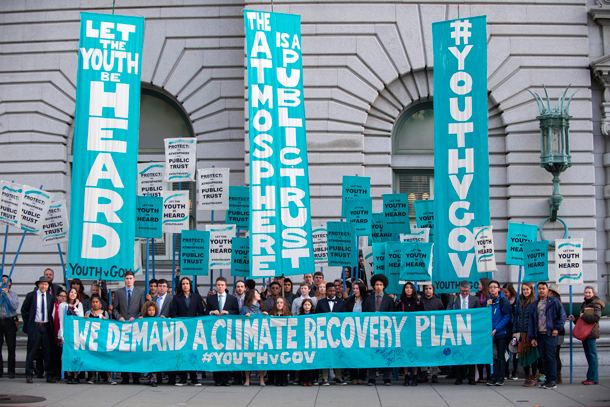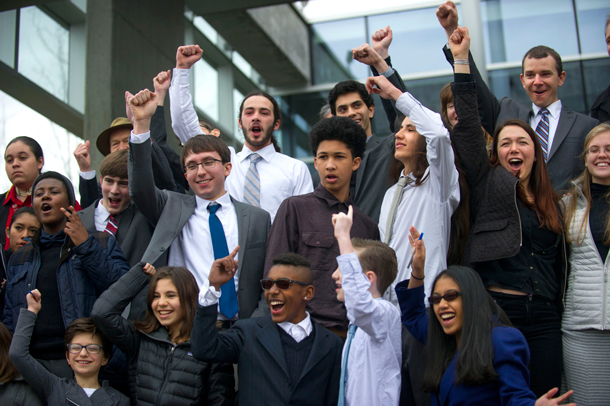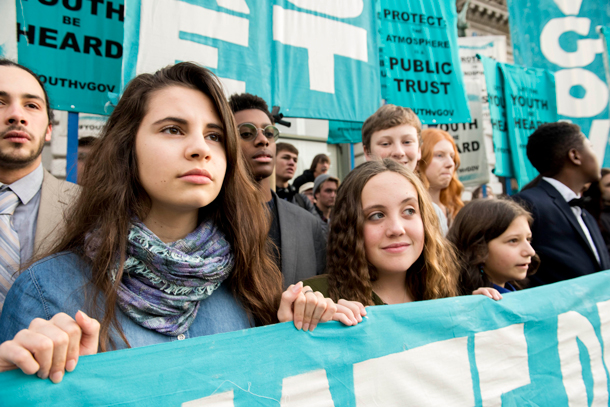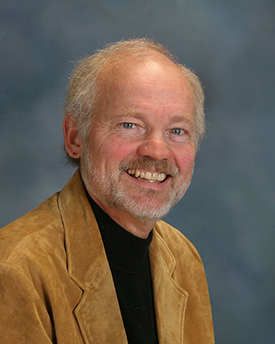The Right To A Livable Climate
Air Date: Week of March 16, 2018

Plaintiffs in the Juliana et al. v. United States outside of the United States Court of Appeals for the Ninth Circuit. (Photo: Robin Loznak)
A federal appeals court recently rejected a bid by the Trump Administration to block a youth climate lawsuit filed in Oregon (Juliana v. US) from moving to trial. This landmark case involves a group of 21 young people who allege that U.S. government actions increase the risk of catastrophic climate change and violate their constitutional rights to life, liberty, and property. Host Steve Curwood and Vermont Law School professor, Pat Parenteau discuss the next steps for what some call ‘The Trial of the Century.’
Transcript
CURWOOD From PRI, and the Jennifer and Ted Stanley Studios at the University of Massachusetts, Boston, this is Living on Earth. I’m Steve Curwood. The Trump Administration must now face a lawsuit brought by a group of 21 young people who say government actions that increase the risk of catastrophic climate change violate their constitutional right to life, liberty and property. A federal appeals court recently denied a bid by the government to throw out this case known as Juliana v. The US, rejecting Administration claims that the suit is too broad and asks for too much. We turn now to Vermont Law School professor Pat Parenteau. Welcome back to the show, Pat. What do you make of this appeals court ruling?
PARENTEAU: Well, the decision is certainly a victory for the plaintiffs in the short run. I think it pretty much guarantees that we're going to have a trial of some kind in the case. The decision is a little bit of a mixed bag for the plaintiffs, the youth plaintiffs in the case because the judges pretty clearly signal, number one, the case is very broad and the kinds of remedies that the plaintiffs are seeking are also, as the judge put it, may be broader than what is judicially feasible. So, the signal to the plaintiffs is you'd better narrow your case down to the specific actions or inactions that you claim are – are the problem. The judges also said and if the discovery process gets out of control – for example, if the plaintiffs start inundating the government with lots of requests for documents and admissions and interrogatories and all the things, of course, that lawyers do, or if they start trying to depose cabinet-level officials, the Ninth Circuit panel said, “You're free to come back to us if you believe that the discovery process is getting out of control, we will be willing to take another look at this, but for now everybody should just settle down, narrow the case and get to trial.”
CURWOOD: And so this judgment that maybe the plaintiffs are asking too much, this is something that the trial judge herself could deal with rather than the government having to appeal that maybe the plaintiffs are asking too much.
PARENTEAU: Yes, that's true and I think the Ninth Circuit has faith in Judge Aiken, the district court judge. She, of course, submitted a detailed letter, which was kind of unusual to the Ninth Circuit, explaining just how she planned to manage the case and indicating she understood the novel nature of the case and the sweeping nature of the relief that the plaintiffs were seeking, and that there was a long way to go before any final rulings were going to be made. So, I think the Ninth Circuit has some confidence that this particular judge is in charge and in control of the case and can keep it under reasonable limits.

A three-judge panel of the United States Court of Appeals for the Ninth Circuit rejected the Trump Administration’s efforts to halt the landmark youth lawsuit, which is suing the government over climate change. (Photo: Robin Loznak)
CURWOOD: I suppose on one level it is a sweeping case. I mean, these kids want an end to climate change.
PARENTEAU: I mean they're claiming, of course, that they have a constitutional right to have the government act in their interest and protect them from the ravages of uncontrolled climate change, and we're obviously every day now, we're seeing different aspects of the strange changes in the Earth's climate system, weather systems, and so the youth plaintiffs are saying, “Now is the time to ask some of these hard questions. What is the government doing or not doing and why?” And that's what we're going to see with this trial.
CURWOOD: So, if this case ... it sounds like more like when this case goes to trial, what can we expect?
PARENTEAU: So, yeah, I think that there's a good chance that the trial may actually get underway yet this year. That might be a little ambitious, but the trial was originally scheduled to start in February. So, I wouldn't be surprised to see the lower court now set a strict schedule for completing what we call the discovery process and setting this down for trial sometime in the late fall, perhaps October, November. And there's a thing in this process that we call a pretrial order and that lists the witnesses that are going to be called and the substance of their testimony and any kind of arguments about what documents are going to be admitted, things like that. So, there will be a housekeeping kind of procedural order that’ll be very important to watch because that'll indicate the shape of the trial, how long it's going to take, how many witnesses and all of that. That's going to be a very important milestone and we should see something like that I'm thinking towards the end of the summer.
CURWOOD: Now, of course, a trial is based on looking at facts through the lens of the law. But if this thing goes to trial in, say, October, or something, it sounds like this could have a tremendous impact on the Fall elections.
PARENTEAU: Oh, I think it will. I think that there's going to be tremendous interest in this trial. People are calling it the trial of the century, the Scopes trial level kind of engagement. Obviously there's drama with the youth plaintiffs, all 11 of them or so in the courtroom watching what's going on, being interviewed on tape. They're very eloquent, these young people as we've seen, of course, in other contexts. They're well-spoken, they're well versed in climate policy and law. It's quite remarkable. So, I'm thinking there's going to be a lot of media interest in this. The trial will occur in Eugene, Oregon, and I think that you're going to see daily kind of reports and bulletins in coverage and maybe we'll see some Tweets from the president, who knows.
CURWOOD: Now you mentioned the Scopes so-called "monkey trial" around evolution back in the 1920s, but some would say that the kind of precedent this case could set is the even bigger than that, you could be looking at Plessy v. Ferguson, when the Supreme Court said that black people had no rights that white people had to respect, or Brown v. the Board of Education that said that segregated schools were illegal. I mean, how big a deal could this case be?

The Juliana et al. v. United States plaintiffs range in age from ten to twenty-one. (Photo: Robin Loznak)
PARENTEAU: While certainly you're right that if the courts conclude that there is a basis in the US Constitution to argue that youth plaintiffs and all citizens, perhaps, have a constitutional right to a safe climate or safe environment if you want to put it that way, that's been the gold standard that a lot of environmental organizations and others have -have sought for a long time, a recognition, formal recognition at the highest level of our legal system, our Constitution, that we all have a right to live in a world, you know, that isn't disintegrating and isn't falling apart and isn't dangerous and out of control. So, that’s as a fundamental right as you could possibly imagine, and if the case gets to the point where we see a decision articulating a new substantive constitutional right that would be more than a landmark. That would really be revolutionary.
CURWOOD: So, now what exactly are these youth alleging that the government is doing to violate their rights to a livable environment?
PARENTEAU: So, it's a long bill of particulars, starting with the president's announcement that we're – quote – “withdrawing from the Paris Agreement.” Now, we haven't actually technically done that yet, that takes a while, but the announcement has been made, the repeal of the Clean Power Plan which was the centerpiece of our commitment to reducing carbon pollution from the electricity sector, the repeal of the fuel economy standards for automobiles and light truck vehicles and off-road vehicles, that's another major rule that would have reduced carbon. That's been on the chopping block of the Trump administration. The repeal of the methane rule controlling methane emissions from the oil and gas industry and the flaring of methane in oil and gas production on public lands, and the repeal of the appliance efficiency standards, yet another major policy initiative that would reduce carbon. So, there's a whole long list of really major sort of regulatory actions that this administration is has either reversed or is in the process of reversing, and I can see that the trial is going to put each and every one of those decisions on trial.
CURWOOD: So, what sense do you have of the strategy the plaintiffs are going to take here? This, in fact, could be such a huge case. The list is very long, that you cited and there are other things I mentioned that other people have put on that list, claiming that the federal government hasn't acted to deal with climate change. What sense do you have of what the plaintiff's strategy is going to be?

Former EPA Regional Counsel Pat Parenteau teaches environmental law at Vermont Law School (Photo: courtesy of Vermont Law School)
PARENTEAU: Well, I hope the plaintiffs take the cue that the judges on the Ninth Circuit panel gave them, Judge Berzon, for example, several times during the oral argument said to Julia Olsen who is the lawyer for the plaintiffs, "You really need to think hard about what are the most important things that the federal government is doing that you believe are exacerbating the threat of climate change." And she focused specifically, Judge Berzon did, on the way public lands and waters are being managed, and the fact that the Trump administration has now leased virtually 90 percent of the coastal waters of the United States to oil and gas development, that it's opened the Arctic National Wildlife Refuge for the first time to massive potential oil and gas development and so forth. I think if the plaintiffs are paying attention and if I were them I would really look to narrow the scope of the case to a relatively small number of major items and major issues that could make a really significant difference in bending this trajectory of emissions in the direction that the scientists are telling us.
CURWOOD: So, if I hear you correctly, Pat, you're saying perhaps the strong if not the strongest strategy here would be to be suing the federal government for selling off fossil fuels from public lands and waters at a time when the government knows that the combustion of those fuels is in the process of destroying the planet?
PARENTEAU: Yes, and these are what we call path determining decisions. When you offer for lease all of these offshore oil and gas deposits, and you lease all of the on land oil and gas in places like the national monuments - Bears Ears which the president, of course, has shrunk to almost nothing – you're determining for a very very long period of time, decades, the way that those lands are going to be managed, the way that those fossil fuels are going to be extracted, and this is all in the face of evidence suggesting we have to be going in the opposite direction, at least slowing down the rate at which we're developing these resources and at least identifying some of the areas that are sensitive environmental areas and this would include some of the Arctic resources and others which would be absolutely the last place you should be going for fossil fuels, not the first.
CURWOOD: Pat Parenteau is a Professor at Vermont Law School. Thanks so much for taking the time with us today.
PARENTEAU: Thanks, Steve. Appreciate it.
Links
Living on Earth wants to hear from you!
Living on Earth
62 Calef Highway, Suite 212
Lee, NH 03861
Telephone: 617-287-4121
E-mail: comments@loe.org
Newsletter [Click here]
Donate to Living on Earth!
Living on Earth is an independent media program and relies entirely on contributions from listeners and institutions supporting public service. Please donate now to preserve an independent environmental voice.
NewsletterLiving on Earth offers a weekly delivery of the show's rundown to your mailbox. Sign up for our newsletter today!
 Sailors For The Sea: Be the change you want to sea.
Sailors For The Sea: Be the change you want to sea.
 The Grantham Foundation for the Protection of the Environment: Committed to protecting and improving the health of the global environment.
The Grantham Foundation for the Protection of the Environment: Committed to protecting and improving the health of the global environment.
 Contribute to Living on Earth and receive, as our gift to you, an archival print of one of Mark Seth Lender's extraordinary wildlife photographs. Follow the link to see Mark's current collection of photographs.
Contribute to Living on Earth and receive, as our gift to you, an archival print of one of Mark Seth Lender's extraordinary wildlife photographs. Follow the link to see Mark's current collection of photographs.
 Buy a signed copy of Mark Seth Lender's book Smeagull the Seagull & support Living on Earth
Buy a signed copy of Mark Seth Lender's book Smeagull the Seagull & support Living on Earth

